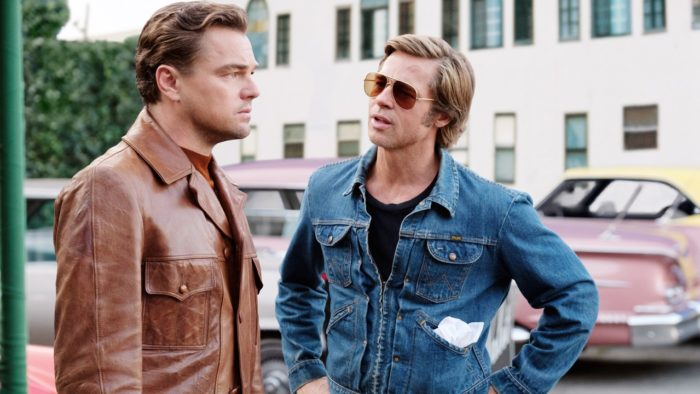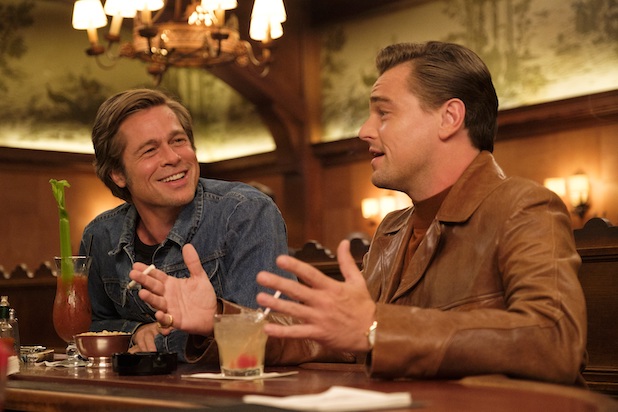Once Upon a Time in Hollywood is a tale of two Tarantinos. Set in 1969 against the twilight of Tinseltown’s golden age, the two-hour-and-forty-five-minute period drama captures the writer-director at his most confident and laidback—and also at his most disappointingly conventional. In 1994, Pulp Fiction made Quentin Tarantino a household name in part because of its radical, non-linear narrative style. The director drew cosmopolitan influence from the global film scene (most notably the French New Wave), and successfully challenged convention with a stylish, adult crime drama that delighted in breaking rules. He’s since veered into more comfortable territory, creating a slew of entertaining but unambitious genre indulgences.

Once Upon a Time in Hollywood follows fading TV star Rick Dalton (Leonardo DiCaprio) and his stunt-double/personal assistant/best friend Cliff Booth (Brad Pitt). Breezy but narratively sparse, it’s the most straightforward film in Tarantino’s winding career. At times it plays almost as a retrospective; here you have Pulp Fiction’s idiosyncratic Los Angeles, there the hazy hangout vibes of Jackie Brown, even the overt western imagery of Django Unchained and the Hateful Eight are present on the studio backlot (Dalton was once the star of a popular black-and-white TV series called “Bounty Law”).
Yet it is unquestionably Inglourious Basterds with its gleeful historical revisionism that serves as the best point of reference for Tarantino’s latest (Basterds even begins with a chapter card titled “Once upon a time … in Nazi-occupied France”). Thus the director frames the two films as fairy tales, here trading Nazis for “hippy” cultists in a subplot centered around real-world actress Sharon Tate (Margot Robbie), who was murdered in her home in the Hollywood hills in August of 1969. Both films flagrantly crisscross the border between fact and fiction, advancing a shared thesis on the power of cinema to combat the horrors of history. Necessarily, both are tied to the idea of movies and moviemaking. In Inglourious Basterds, film itself is weaponized; in Once Upon a Time in Hollywood, LA is the world’s largest movie set.
What distinguishes Once Upon a Time in Hollywood as more than mere Basterds rehash or pale pastiche of Tarantino clichés is its sincere emotional center. The filmmaker has written so many blithe, shit-talking assassins and callous, loquacious criminals that the low-key bromance between Rick and Cliff comes as a genuine surprise. Plus, the pair are flawed in more endearing, human ways than your typical QT anti-heroes. Dalton is a self-described “has-been” with a stubborn cough and a drinking problem; Booth is an aimless underachiever who lives in a trailer behind a drive-in movie theater. All these two relics have is one another, and honestly, it’s kind of sweet.

Naturally, it wouldn’t be a Quentin Tarantino movie without a few moments of the manic violence the director has made his hallmark. Once Upon a Time in Hollywood feels perfunctory in this regard—the carnage plays as a concession to expectation rather than an honest consequence of the actions that inspire it. Perhaps the director is aware of this; Tarantino is an aggressive self-analyst when it comes to his body of work, and he’s made no secret of his intent to retire after his tenth film. Once Upon a Time in Hollywood is now number nine, and it’s a perfectly worthy penultimate effort. It cements Tarantino’s effortless ability to create characters that pop and to make two-hours-and-forty-five minutes vanish in a flash.
Still, it’s authored by a fundamentally different filmmaker than the auteur that unleashed Pulp Fiction onto unsuspecting moviegoers two-and-a-half decades ago. Its nostalgic winks and nods to the Tarantino of yesteryear further reinforce how unoriginal Once Upon a Time in Hollywood feels by comparison. Like Dalton, the director seems increasingly at odds with himself and his place in an industry he struggles to recognize, straining just a little bit harder each day to find the success that once came so easily.